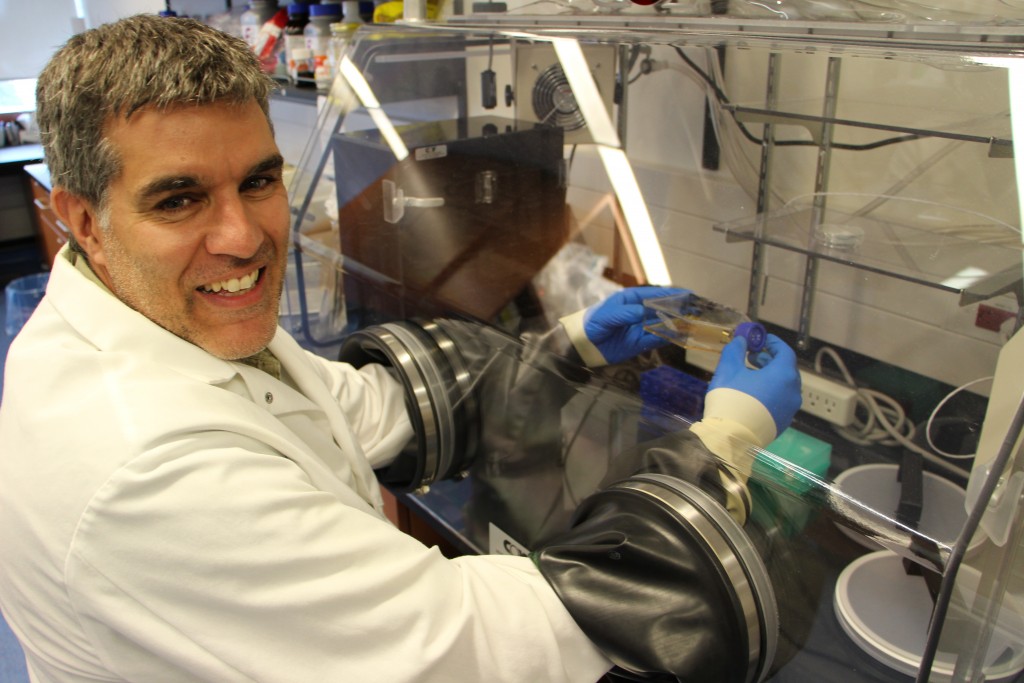A University of Guelph professor who as a child was inspired by Terry Fox to study cancer has received a $450,000 grant from the Terry Fox Research Institute (TFRI), the research arm of the Terry Fox Foundation.
Byram Bridle, a viral immunologist in the Department of Pathobiology, will test an innovative vaccine in the first-ever canine osteosarcoma clinical trial, to take place in the Ontario Veterinary College’s Mona Campbell Centre for Animal Cancer.
Osteosarcoma is the type of bone cancer that cut short Fox’s cross-Canada Marathon of Hope in 1980. This year marks the 35th anniversary of that run, and it’s the first time the Terry Fox Foundation has supported research at a veterinary school, said Malcolm Campbell, U of G’s vice-president (research).
“This is a great honour for the University of Guelph and our Ontario Veterinary College,” Campbell said.
“This exciting partnership will allow our cancer researchers to push the boundaries of knowledge. University of Guelph researchers will collaborate on novel therapies for treating osteosarcoma in dogs — work that will provide new insights into treating the disease in people.”
Bridle is among six national researchers to receive Terry Fox New Investigator Awards this year.
TFRI president and scientific director Victor Ling said, “These three-year awards enable top new talent at research institutions to gain valuable mentorship experience from world-class research teams.”
The institute uses funds raised by the Terry Fox Foundation to support researchers at cancer care and academic institutions across Canada. The foundation supports nearly $26-million worth of research each year across the country.
Bridle will be mentored by renowned cancer researcher John Bell from the Ottawa Hospital Research Institute.
Now applying for regulatory permission to begin the veterinary clinical trial next year, Bridle said he’s “thrilled that such a world leader in cancer research has seen fit to invest in a new program.”
He said “the Terry Fox Research Institute is showing great vision by funding a veterinary cancer trial that aims to develop a highly targeted, cost-effective new treatment.”
Bone cancer developed by dogs is almost identical to that seen in adolescents and young adults, and the disease progresses in much the same way, Bridle said.
But dogs develop osteosarcoma 10 times as often as humans. OVC’s Animal Cancer Centre sees up to three new cases each week.
Despite aggressive treatments such as limb amputation and chemotherapy, many dogs still die from metastatic disease, which usually appears in the lungs.
Bridle’s research combines two novel cancer therapies — immunotherapy and oncolytic viruses – that harness a patient’s immune system to prevent metastasis.
Oncolytic viruses are harmless to humans and animals and kill only cancer cells, while immunotherapy uses the immune system to destroy tumours.
“We hope that combining cancer immunotherapy with oncolytic virotherapy will be a breakthrough in our ability to stop the metastatic lesions that ultimately kill patients,” said Bridle.
He also belongs to a TFRI-funded national research team studying oncolytic viruses in humans.
Referring to the planned canine trial, dog owner Mary LaHam said “this research is just tremendously exciting.”
Her greyhound, Jaynie, succumbed to osteosarcoma in July despite having her left front leg amputated and receiving chemotherapy at OVC. She was the second dog LaHam has lost to the disease.
“I love the idea that, instead of going through amputation and chemotherapy with all the anguish that goes with it, something as simple and non-invasive as a vaccine can, in the best of all possible worlds, cure the disease,” LaHam said. “It’s just so phenomenal.”
No such vaccine existed when Fox was diagnosed with osteogenic sarcoma in 1977. He ran more than 3,000 miles across Canada to raise money and awareness for cancer research. He died in 1981 at age 22 after raising more than $24 million.
Bridle was eight years old when Fox began his run. “His legacy and passion to help those suffering from cancers was one of many important contributions to my career path,” said Bridle.
Developing optimal ways to treat cancer in dogs before moving to humans might be considered uncommon, he said.
“However, one thing that Terry Fox’s life taught me is that it sometimes takes unconventional approaches to achieve extraordinary results. I like to think that he would be proud of what we are attempting to accomplish through this new partnership.”
